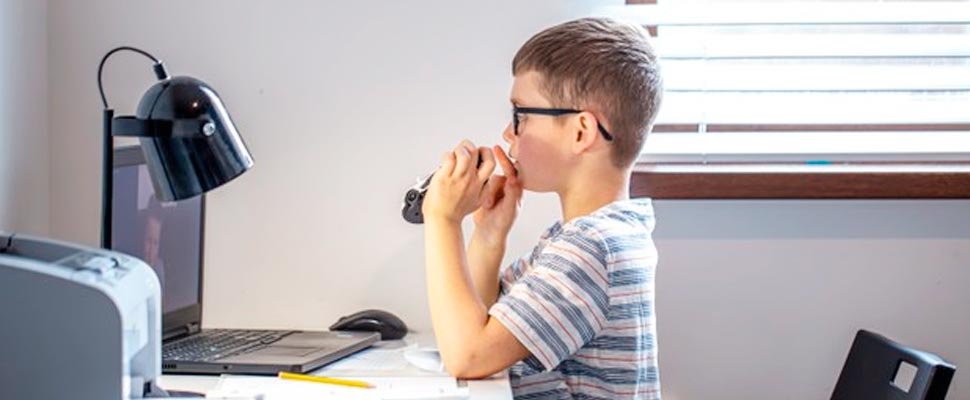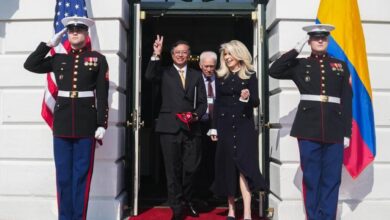“I Have Third Grade Kids With Panic Attacks”: Schools in Latin America Struggle With the Pandemic
This Week Children Returned to Schools in Some Cities Of Mexico, But Not All Countries Have Been Able to Return to School.

Poverty, inequality and inequality have turned online classes into a luxury. Photo: Freepik
LatinAmerican Post | Santiago Goméz Hernández
Listen to this article
Leer en español: “Tengo nenes de tercer grado con ataques de pánico”, la escolaridad virtual en pandemia
Since March 2020, the world went into quarantine and restrictive measures were implemented. All non-essential sectors went virtual. Accordingly, schools began to teach classes remotely. However, poverty, inequality, and inequality have turned online classes into a luxury.
Reportan primer contagio de Covid-19 tras regreso a clases en CDMXhttps://t.co/EeWGQOPJAP pic.twitter.com/x1MlNV3GGV
— Aristegui Noticias (@AristeguiOnline) June 11, 2021
In Latin America, the return to face-to-face classes is uneven and incomplete. In most cases, there is, at best, hybrid learning, in which half the classroom takes face-to-face classes and the other half watches them from home.
Also read: This is how Post Covid world will be
For many countries in the world, the return to physical schools is increasingly normal. Gone are the confinements, but not the video calls, since several schools have begun to integrate the tools left by this crisis to create new educational strategies.
There are positive changes
Virtuality has brought certain benefits. Estefanía Prada Mora, a Colombian mother, and teacher assures that after a complex start and with various frustrations, her children have been able to master virtual tools. Today, they can connect, ask, find, and handle everything alone without help.
Madelaine Michaux, an Argentine teacher at a school in Buenos Aires and another in the province, on the outskirts of the capital, also believes that there are many elements that both teachers and students discovered thanks to virtuality. The English teacher believes that after the pandemic is over, certain elements should still be kept.
The problems of virtuality
Virtual schooling has not only brought benefits. Teachers and parents are concerned about various challenges they have had to face since March 2020. The most obvious and the one suffered by all students is the lack of socialization. Michaux comments on how many times he has had to put aside the topic schedule and just start talking to his students. Many of them have already suffered from panic attacks, stress, frustration, etc.
The Argentine teacher assured that last year she had students who cried because "they had not seen the sun for 3 months" or who suffered panic attacks and were not able to turn on their cameras or connect to the class.
Likewise, Prada explains that her two little kids last year failed to create new emotional relationships with any partner. Virtuality, she believes, can affect their social skills.
Both teachers acknowledge that it has also been a challenge trying to keep their students' attention. When they see the computer cameras turned off and children disconnected with the issues, they themselves also get frustrated.
But in addition to these problems that affect everyone equally, this pandemic still hits a certain population more than others. Michaux, who teaches at a private school in the city and a public one on the outskirts of the capital, sees these differences well. Throughout the course of the pandemic, she had several dropouts. "In a course of 20 students, I have 4 that do not connect (..) and in one of 33, I have 6 that do not connect. For example, I have a girl with family issues and they do not have devices to connect. Other children are half abandoned by their family. " The reason is clear: their families have no way to provide them with a tablet, a computer or a cell phone so that they can connect.
Colombia faces not only Covid-19, but also the National Strike
Although it seems that the vaccination program is already taking shape and is advancing at a safe pace, the return to classes, at least in public schools, is not so close. This is not only due to the request of the teacher's union but also because of the protests that are taking place in several cities of the country.
“Tenemos que robustecer el movimiento, esto es de largo aliento, esto es para llegar con miras para el 2022 … para derrotar al Centro Democrático, para derrotar la ultraderecha y llegar al poder en el 2022”, Nelson Alarcón, de Fecode, los maestros (Comité de Paro) ¿qué opina? pic.twitter.com/t41SVDl71e
— Vicky Dávila (@VickyDavilaH) June 10, 2021
Recently, Nelson Alarcón, the president of the teachers union FECODE, was recorded while speaking with a group of protesters. Here, the union leader assured them that the civil struggle is long-term since next year will be presidential elections. This speech was rejected by several sectors since it would indicate that despite the advance in vaccination, the classes would be detained due to a political issue.
The miracle of community colleges in Ecuador
But not everything is bad. Due to all the educational catastrophe brought about by the pandemic, the British newspaper The Guardian discovered that the results did not end up being negative everywhere. According to the media, in the small indigenous village of San Clemente and in the Afro town of Playa de Oro (both in Ecuador), the community colleges took on a new role.
These communities, so far removed from "development" and globalization, became sanctuaries against Covid-19. Many of the Afro or indigenous population living in cities like Guayaquil, devastated by the pandemic, returned to their communities. This resulted in an increase in attendance at community colleges in these areas.
Not only did this end up strengthening this system, it also reinforced the idea of community in these towns. These schools are not just public schools, they are community schools. This means that some teach Quechua and environmental protection. The idea of both Afro-Ecuadorian and indigenous identity is also reinforced since the teachers are part of these peoples.
Many of these students may have had to drop out of school to continue in the cities from virtuality. The community colleges turned out to be the salvation for the education of these minors.




